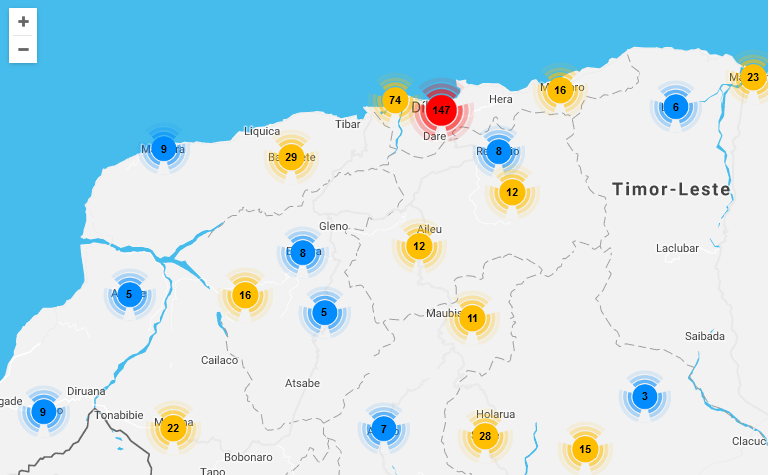Early Warning, Early Response (EWER) System
 Update 2019, The Early Warning, Early Response (EWER) system uses a volunteer monitoring network to gather data and information about violent incidents and situational change in 3 municipalities of Timor-Leste. 10 monitors operating in 10 Administrative posts collect the data, which is then transmitted via tablet computer to the Belun office for analysis and Belun’s new Incident and Conflict Potential Data Portal.
Update 2019, The Early Warning, Early Response (EWER) system uses a volunteer monitoring network to gather data and information about violent incidents and situational change in 3 municipalities of Timor-Leste. 10 monitors operating in 10 Administrative posts collect the data, which is then transmitted via tablet computer to the Belun office for analysis and Belun’s new Incident and Conflict Potential Data Portal.
EWER data and analysis are compiled periodically and published in four formats:
- Alerts are released when incidents or trends of serious concern are recorded by the EWER monitoring system.
- Monthly situation reviews summarize the most notable incidents and trends recorded by the EWER monitoring system and present a graphical review of all incidents recorded each month.
- Conflict Potential Analysis Reports review EWER data over a longer period (4 months to 1 year) to better identify long-term trends and changes to the security situation at the administrative post, municipality and national levels.
- Research Reports and Policy Briefs present an in-depth look into an issue or theme that EWER monitoring has identified as having had a serious impact on the security situation in Timor-Leste and/or that has the potential to negatively affect the security situation in the future.
Each EWER Alert, Conflict Potential Analysis report and Research Report presents a series of recommendations to relevant stakeholders in order to initiate policy reform and intervention both locally and nationally. Please click here to access all of Belun’s EWER publications.
All EWER publications are disseminated through the EWER Municipalities Coordinators to Conflict Prevention and Response Networks (CPRNs) in 10 sub-districts. The EWER program supported the establishment of the CPRNs as a means to increase community capacity for conflict prevention. Most CPRNs include representatives from the PNTL, Secretary of State for Security National Directorate of Community Conflict Prevention, local government, traditional local councils, civil society, youth groups, veteran groups, political parties, and interested community members.
Each CPRN meets three times a year to discuss the security situation in the administrative post and plan peace building activities that are occasionally supported by Belun’s small grants fund. Peace building activities include:Tara bandu (traditional oath ceremonies), community dialogues and seminars or training.
Key stakeholders: The Secretary of State for Security, including the National Directorate for Community Conflict Prevention, the Ministry for Social Solidarity, the PNTL, the F-FDTL, sub-district-level Conflict Prevention and Response Networks, local government, community leaders, civil society groups, political party leaders, veteran groups, and martial arts groups.
Geographic coverage:The EWER system is operational in 3 municipality and 10 administrative posts:
- Baucau Municipality – Administrative posts: Baucau, Laga and Vemasse
- Covalima Municipality – Administrative posts: Suai, Zumalai and Tilomar
- Oekusi Municipality – Administrative posts: Pante Makasar, Oesilo, Pasasbe and Nitibe
Key events:
- Administrative post CPRN trimester meetings facilitated by EWER Municipality Coordinators
- CPRN peace activities, which are occasionally supported by the Belun small grants fund or other donors. Activities include:Tara banduai (traditional oath ceremonies), community dialogues and seminars or training
- National roundtable meetings to obtain feedback on major publications
- Conflict Transformation training for EWER volunteer monitors by the Belun Conflict Prevention Specialist
Program Contact: Maria Marilia Ximenes Castro de Oliveira da Costa (bylah.belun@gmail.com)
Program Timeframe: January 2018-December 2019
Belun asserts that the views expressed by this program do not necessarily reflect the views of the United States Agency for International Development (USAID) and the United States Government, European Union, GIZ/BMZ, the Government of Ireland and UNDP
